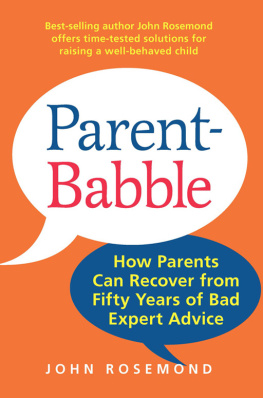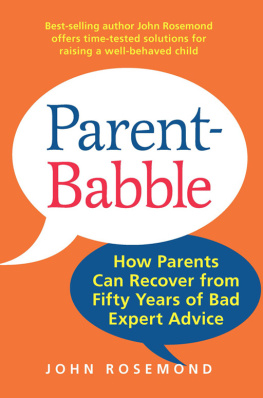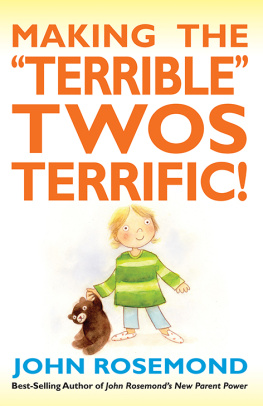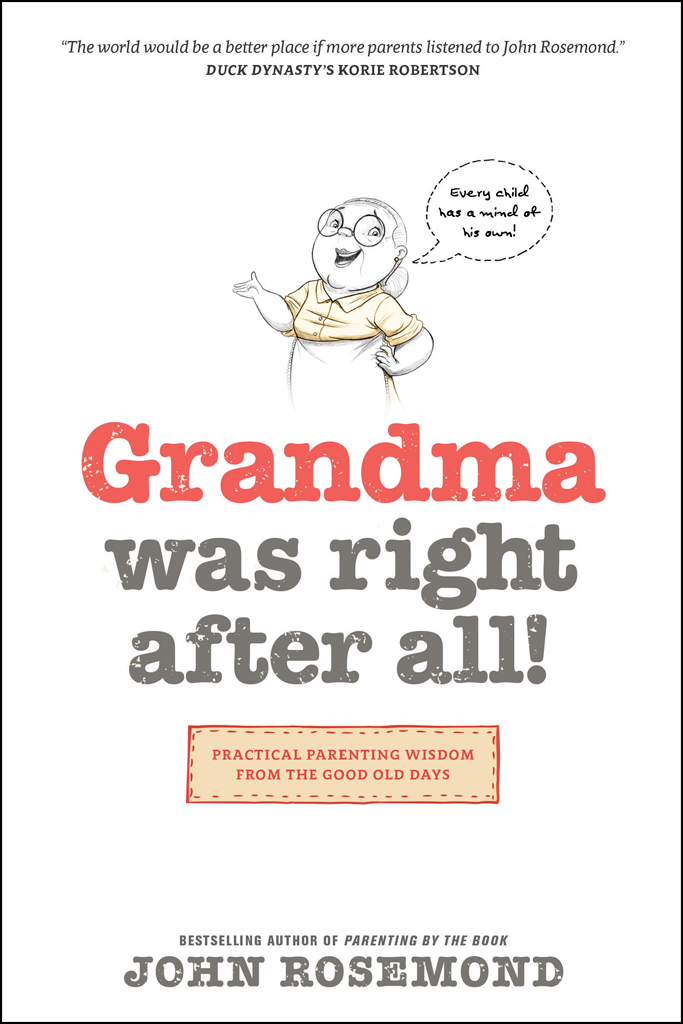Visit Tyndale online at www.tyndale.com.
TYNDALE and Tyndales quill logo are registered trademarks of Tyndale House Publishers, Inc.
Grandma Was Right after All!: Practical Parenting Wisdom from the Good Old Days
Copyright 2015 by John Rosemond. All rights reserved.
Cover and interior illustrations by Mariano Epelbaum. Copyright by Tyndale House Publishers, Inc. All rights reserved.
Illustration of handbag copyright 1blackpen/Dollar Photo Club. All rights reserved.
Illustration of speech bubble copyright ardjo_soekamto/Dollar Photo Club. All rights reserved.
Designed by Ron Kaufmann
All Scripture quotations, unless otherwise indicated, are taken from the New King James Version, copyright 1982 by Thomas Nelson, Inc. Used by permission. All rights reserved.
Scripture quotations marked NIV are taken from the Holy Bible, New International Version, NIV. Copyright 1973, 1978, 1984, 2011 by Biblica, Inc. (Some quotations may be from the earlier NIV edition, copyright 1984.) Used by permission. All rights reserved worldwide.
Scripture quotations marked ESV are taken from The Holy Bible, English Standard Version (ESV), copyright 2001 by Crossway, a publishing ministry of Good News Publishers. Used by permission. All rights reserved.
Library of Congress Cataloging-in-Publication Data
Rosemond, John K., date.
Grandma was right after all! : practical parenting wisdom from the good old days / John Rosemond.
pages cm
ISBN 978-1-4964-0591-3 (sc)
1. Child rearing. 2. Parenting. I. Title.
HQ769.R7134 2015
649'.1 dc23 2015019769
ISBN 978-1-4964-1017-7 (ePub); ISBN 978-1-4964-0592-0 (Kindle); ISBN 978-1-4964-1018-4 (Apple)
Build: 2015-07-13 08:51:57
Honor your father and your mother, that your days may be long upon the land which the L ORD your God is giving you. EXODUS 20:12
When the foundations are being destroyed, what can the righteous do? PSALM 11:3, NIV
Trust in the L ORD with all your heart, and lean not on your own understanding; in all your ways acknowledge Him, and He shall direct your paths. Do not be wise in your own eyes; fear the L ORD and depart from evil. It will be health to your flesh, and strength to your bones. PROVERBS 3:5-8
Understand this, that in the last days there will come times of difficulty. For people will be lovers of self, lovers of money, proud, arrogant, abusive, disobedient to their parents, ungrateful, unholy, heartless, unappeasable, slanderous, without self-control, brutal, not loving good, treacherous, reckless, swollen with conceit, lovers of pleasure rather than lovers of God, having the appearance of godliness, but denying its power. Avoid such people. 2 TIMOTHY 3:1-5, ESV
This is dedicated to the one I love.
(My thanks to Lowman Pauling, Ralph Bass, The 5 Royales, The Shirelles, The Mamas and the Papas, and Linda Ronstadt for the inspiration.)

The vernacular or colloquial speech of a culture has meaning beyond the meanings of the words themselves. There is meaning the accepted or dictionary definition of a word and then there is what is termed metameaning what the words reflect concerning the culture, among other things. Take, for example, the recently popular phrase Get a life. The words themselves can mean a variety of things, depending on context. The phrase can mean that the person its spoken to is obsessing about something trivial. Sometimes Get a life is used to end a contentious discussion, when the speaker doesnt know what else to say. Whatever the immediate intent or meaning, however, Get a life is always, without exception, a sarcastic form of disrespect. Its a dismissal or belittling of another persons point of view, and its recent ubiquity is a reflection of the general deterioration of respect that has taken place in America since the 1960s. Get a life is the sort of thing people begin saying to one another when self-centeredness trumps all other social considerations.
In other words, popular vernacular reflects the zeitgeist the cultures mind-set or collective worldview. Likewise, the loss of certain vernacular reflects the loss of a certain consensual point of view. When I was growing up, the sayings of Ben Franklin as recorded in his Poor Richards Almanack were still in common usage. Everyone my age, when we were kids, was told, A penny saved is a penny earned. We also heard Waste not, want not, another of Franklins sayings. With a nod to the extremely rare exception, kids dont hear either of those aphorisms anymore. The explanation for their effective disappearance is not that theyre old fashioned. Consider that they were still in common use in the 1950s, when they were already two hundred years old very old fashioned indeed. Ben Franklins sayings have fallen out of fashion because frugality is no longer a commonly held American virtue. We live in a spendthrift, wasteful age. Consumerism rules the America of today. In fact, a frugal person today is regarded as a cheapskate, a tightwad.
As with sayings like A penny saved is a penny earned, the entire parenting vernacular of the pre1960s has virtually disappeared and been replaced by... nothing. Well, thats not exactly true. The vernacular of post1960s American parenting consists of phrases like Good job! and Thats terrific! and Give me five! and Youre the best! and When you grow up, you can do anything you want to do. This is very new and novel parenting language, for sure. My parents occasionally told me Id done a good job, but for every good job, they told me at least three times that I could have done a better job. And when they did tell me Id done a good job, it didnt carry an exclamation point. It was matter-of-fact, straightforward, and because it was doled out conservatively, I knew Id really, truly done a good job.
And make no mistake: my parents were typical of their generation. Overwhelmingly my peers tell me their parents were interchangeable with mine. I knew my parents loved me, but they apparently didnt think that being stingy with praise would damage my psyche, and it didnt. Neither did being told that I was acting too big for my britches, which I heard nearly every time I acted too big for my britches.
Taking that example, it is very rare for children today to hear they are acting too big for their britches. Instead, their parents tell them, with great effusion, that they have done a great job followed by one or more exclamation points at least once a day (less than that will starve their psyches of warm fuzzies, which are necessary to the proper formation of high self-esteem). Some kids are told theyve done a great job or words to that effect at least five times a day. It doesnt matter how well they do something; its a great job, exclamation point. Give me five! Chest bump! Youre the man!
The near extinction of Youre acting too big for your britches and the rise of the indiscriminate Great job! reflect the fact that since the 1950s we have lost one parenting point of view and replaced it with one that is quite the opposite. In the 1950s, modesty was a virtue that parents tried to instill in their kids. Therefore, when children were acting immodestly, they were told they needed to resize themselves to their britches. Today, high self-esteem is the ideal, the brass ring of la dolce vita. Parents in the 1950s and before attempted to rein in their childrens natural inclination toward high opinions of themselves. Todays parents, by and large, make no such attempt. They















